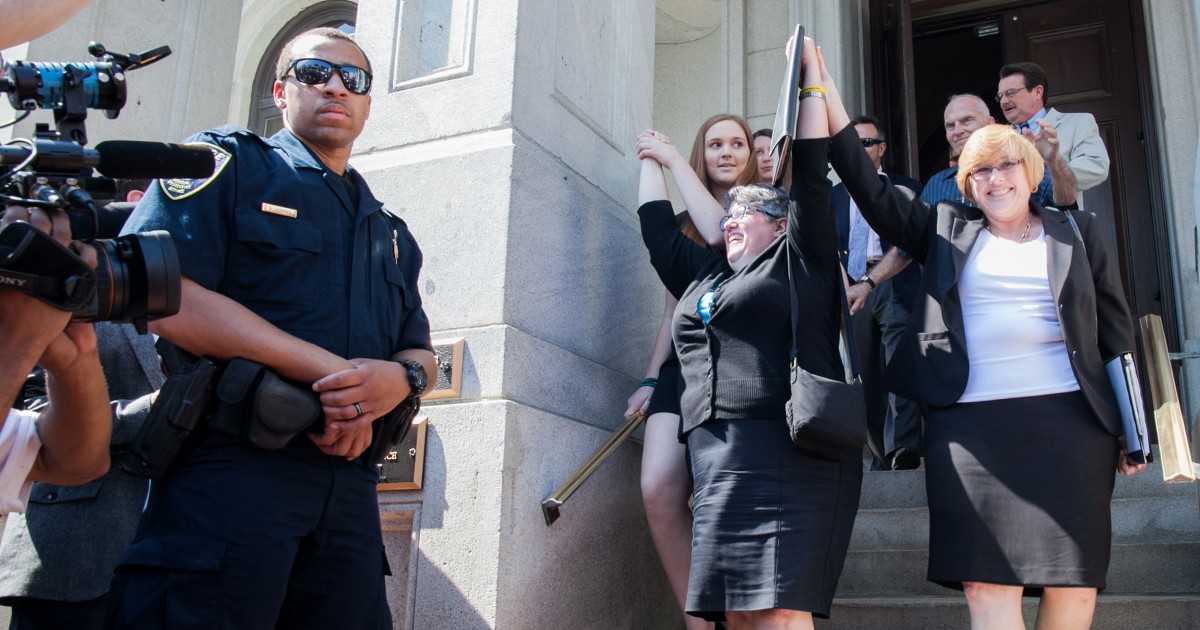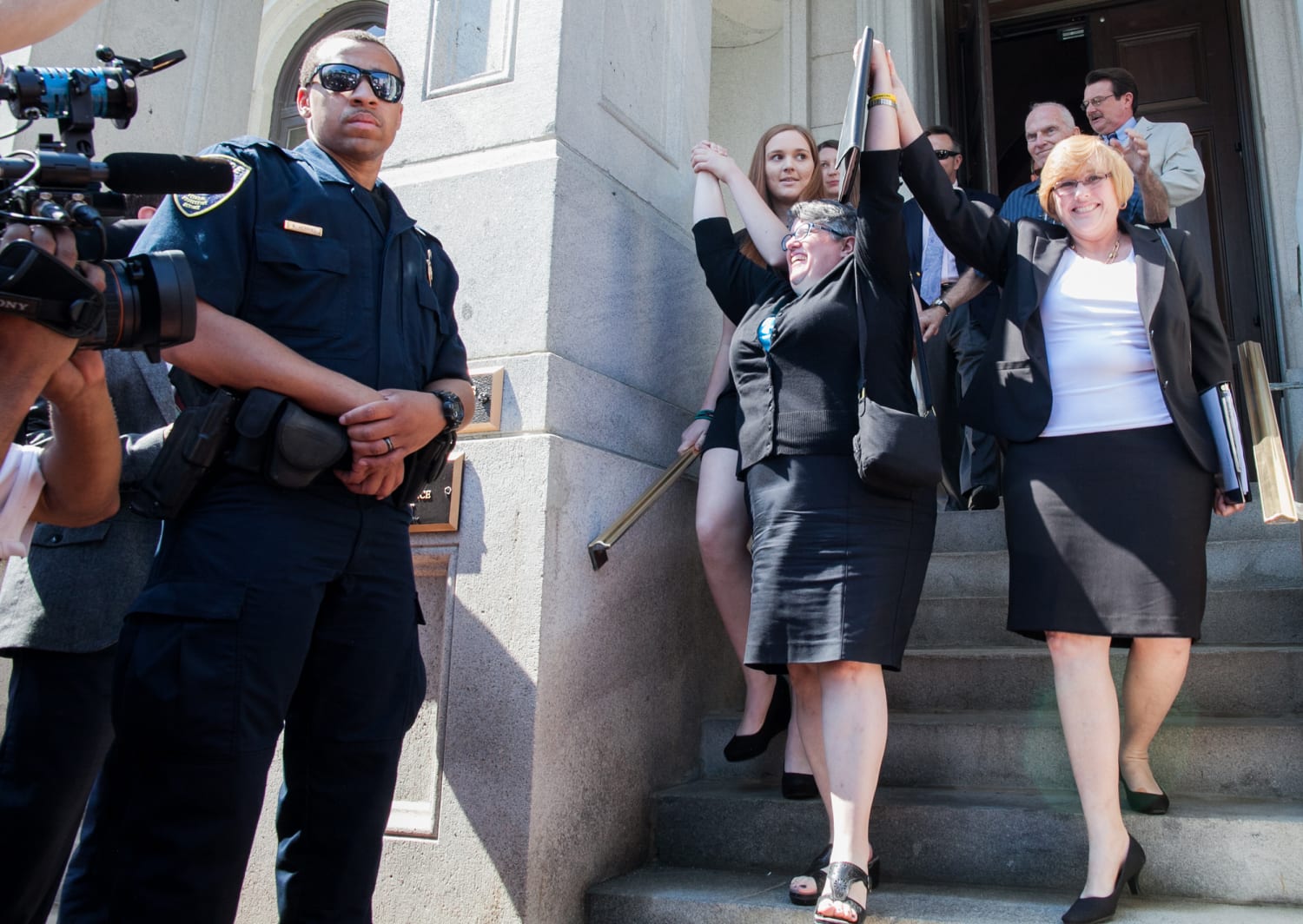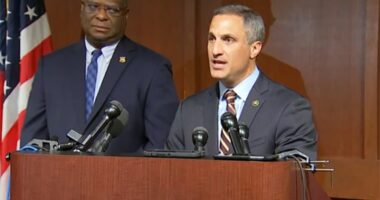
Even though it’s been more than five years since the Supreme Court ruled in Obergefell v. Hodges that same-sex couples have the right to marry “on the same terms and conditions as opposite-sex couples,” dozens of states still have constitutional amendments on the books that ban gay marriage.
Virginia is one of those states, and its first openly LGBTQ legislator is leading the charge to ax the outdated law.
Democratic state Sen. Adam Ebbin is sponsoring SJ 270, which would replace language in the state Constitution defining marriage as the union of one man and one woman with an affirmative statement that the right to marry is fundamental “regardless of the sex or gender of the parties to the marriage.”
“For young LGBTQ people, or even those who aren’t married or don’t want to get married, removing this language is an important step … It tells them that they matter, that they are equal to everyone else in the state.”
Fran Hutchins, Equality Federation
On Feb. 5, SJ 270 cleared the Senate by a margin of 24 to 12. One day earlier, HJ 582, the House version, passed 60 to 33.
In Virginia, though, overturning a constitutional amendment is a two-year process — one that requires two separate General Assembly sessions separated by a general election to pass identical bills before a measure is put on the ballot for a public vote.
Since the landmark Obergefell ruling, at least eight states have tried to remove similarly unenforceable marriage bans, according to the Equality Federation. In November, Nevada became the first to do so, with 62 percent of voters backing the measure.
But 30 states still have such prohibitions written into their constitutions, according to the Movement Advancement Project. Sixteen of them also ban civil unions, and two, including Virginia’s, prohibit any legal recognition of gay relationships.
“For young LGBTQ people, or even those who aren’t married or don’t want to get married, removing this language is an important step,” Equality Federation Executive Director Fran Hutchins said. “It tells them that they matter, that they are equal to everyone else in the state.”
But homophobic laws can have a long shelf life in Virginia. Although the Supreme Court ruled that sodomy bans were unconstitutional in 2003’s Lawrence vs. Texas decision, it took a full decade for Virginia’s to be struck down — and even then it was by a federal appeals court, not by legislators.
The Code of Virginia first restricted marriage to different-sex couples in 1975, the same year clerks in Arizona and Colorado issued marriage licenses to same-sex couples. In 1997, the General Assembly passed a statute denying recognition of gay marriages performed in other states.
Then, in 2006 — three years after Massachusetts became the first state to allow same-sex marriage — lawmakers sponsored the Virginia Marriage Amendment, a ballot initiative reserving the institution for one man and one woman. Also known as the Marshall-Newman Amendment, the measure further barred any recognition of unmarried couples “that intends to approximate the design, qualities, significance, or effects of marriage.” Voters approved the resolution 57 to 43, and it was implemented as Article I, Section 15-A of the Virginia Constitution.
Civil rights advocates argued its broad language could be used to invalidate living wills, powers of attorney and even property agreements between same-sex partners. In an opinion piece in The Washington Post, gay conservative Jonathan Rauch branded the amendment a “Jim Crow” law for the 21st century.
“It disenfranchises gay people as individuals,” he wrote. “It makes us nonpersons, subcitizens. By stripping us of our bonds to each other, it strips us even of ownership of ourselves.” In January 2014, Virginia Attorney General Mark Herring announced his office would not defend the amendment in federal court.
“I believe the freedom to marry is a fundamental right,” Herring told reporters at the time, “and I intend to ensure that Virginia is on the right side of history and the right side of the law.”
Less than a month later, U.S. District Judge Arenda Wright Allen for the Eastern District of Virginia found the Virginia Marriage Amendment unconstitutional in Bostic v. Rainey, paving the way for same-sex marriage in Virginia later that year.
Then, in June 2015, the Supreme Court ruling in Obergefell v. Hodges guaranteed the freedom to marry on the federal level.
Last March, the Virginia General Assembly repealed two laws banning same-sex marriage. But neither that nor the Obergefell ruling can remove what Ebbin calls “a stain” on the Virginia Constitution.
“All citizens deserve the dignity to know they won’t be targeted and denied their rights, and an affirmative statute does that,” he told NBC News. “It’s not about personal opinion; it’s about the law. You can keep your marriage between a man and a woman, but the law says it’s a right for everyone to enjoy.”
He and state Delegate Mark Sickles, who is also gay, have been introducing bills to update the state Constitution since 2015. Before now, they had always been defeated. This time, they received support from 11 Republicans, including state Senate Minority Leader Tommy Norment, R-James City, who supported the original 2006 marriage ban amendment.
Virginia’s progressive evolution
Democrats in Virginia have moved quickly to advance LGBTQ rights since gaining control of the General Assembly in 2019: Last year, the Legislature banned so-called conversion therapy on minors and passed the Virginia Values Act, making it the first Southern state to pass anti-discrimination protections for the LGBTQ community.
This session, lawmakers are also working to repeal Virginia’s HIV criminalization law and strike down religion-conscious exemptions for foster care and adoption agencies.
Danica Roem, the first transgender member of the Virginia General Assembly, is also introducing legislation to ban the so-called panic defense, which has been used to excuse or mitigate violent crimes against gay and transgender people.
Ebbin said the General Assembly has become increasingly supportive of gay rights since he started as a delegate in 2004. The LGBTQ caucus now has five members, including Roem.
“We’ve moved from being on the defensive to where we as a governing body affirm the rights and equality of all Virginians,” he said. “It was a bipartisan vote, and there wasn’t an active opposition on the floor.”
There’s also support among voters: In 2014, 50 percent of Virginians supported same-sex marriage, according to the Public Religion Research Institute. By 2017, the last year the group polled on the question, that had jumped to 60 percent.
In 2020, a national polI by the group found a record 70 percent of Americans supported same-sex marriage, including about half of Republicans.
“They realize gay people can get married and the sky won’t fall,” Ebbin said. “So unless the Legislature goes through some drastic change, I predict that we’ll pass it.”
Still, efforts to repeal the marriage amendment have been met with resistance.
In an email to members, Victoria Cobb, president of the conservative Family Foundation of Virginia, warned that Ebbin and Sickles were trying to redefine marriage “outside of what God has designed for human flourishing.”
“As expected, all of society, including those whose deeply held convictions have not moved with secular society, are uniformly expected to not only abide those with differing views on marriage but embrace them in their speech and celebrate them in their business life,” she wrote, the Tennessee Star reported.
State Sen. Amanda Chase, a Trump loyalist running for governor, told the Virginia Mercury she voted against Ebbin’s measure to take “a stand for traditional values.”
“I personally believe that marriage is between a man and a woman,” said Chase, who has been formally censured for supporting the Capitol rioters and is suing her own party for holding a nominating convention in lieu of a primary. “If other people choose differently, that’s their choice, but I do not believe that this should be a constitutional amendment.”
Delegate Kirk Cox, the other Republican lawmaker running for governor, opposed Sickle’s bill in the House. Though the proposal includes a provision allowing clergy to refuse to perform any wedding, a spokesperson for the lawmaker told the Mercury that “Delegate Cox’s faith informs his views of the nature of marriage.”
“In the competition to demonstrate who is the most extreme and out of touch, Cox and Chase are neck and neck,” Anna Scholl, executive director of Progress Virginia, said in a statement. “This vote against marriage equality is just the latest example.”
On the national level, the Republican Party’s national platform — which hasn’t changed since 2016 — defends “natural marriage, the union of one man and one woman” as the cornerstone of the American family, and affirms that “every child deserves a married mom and dad.”
The GOP headquarters did not respond to a request for comment about Virginia’s proposals.
‘A tale of two states’
Carol Schall, a plaintiff in Virginia’s 2014 gay marriage case, said it is well past time Virginia’s Constitution reflect the will of the people. And there’d be a sort of historic symmetry, too: It was Virginia’s anti-miscegenation law, after all, that spurred Loving v. Virginia, the Supreme Court decision outlawing bans on interracial marriage.
“Virginia has long been on the wrong side of history when it comes to civil rights,” Schall said. “But we finally got this one right. This amendment doesn’t reflect the reality anymore.”
An associate professor at Virginia Commonwealth University, Schall has been with her wife, Mary Townley, for 36 years. The two were legally married in San Francisco in 2008, during the brief window when California recognized same-sex marriages before the passage of Proposition 8.
Schall said leaving your rights to a court decision “is kind of naive,” especially considering how the Trump administration appointed more than 50 circuit court judges and three Supreme Court justices in just four years. LGBTQ civil rights group Lambda Legal issued a report last month that found nearly 40 percent of Trump’s confirmed federal appellate judges have a “demonstrated history of anti-LGBTQ+ bias.”
Following the high court’s rejection of an appeal from former Kentucky county clerk Kim Davis last year, conservative Supreme Court Justices Clarence Thomas and Samuel Alito (neither of whom was a Trump appointee) issued a scathing dissent that said the Obergefell ruling “will continue to have ruinous consequences for religious liberty.”
“If the courts change their minds — which they do — as long as we have that amendment, the state would have to enforce it,” Schall, 60, said. “I don’t want that hanging over my family’s head.”
Schall lived in Virginia in 2006 and was canvassing outside a polling station when voters passed the Virginia Marriage Amendment. She recalled having flyers opposing the measure shoved back in her hands.
“It was terrible,” she said. “It felt very personal — like all of Virginia voted and I lost.”
Since then, she said, there’s been a seismic shift. Virginia has gone from a Republican stronghold to a solidly blue state that went for Joe Biden in November.
“We used to be the state of Pat Robertson and Jerry Falwell, of Ralph Reed. It didn’t feel safe to be out at work, to be out to my neighbors,” she said. “It’s different now. Virginia has done this mindfully, the work of educating our neighbors, and at some point the zeitgeist here shifted.”
Well, maybe not entirely, she added.
“Virginia is really a tale of two states,” she said. “In the east, you have the ‘golden crescent’ that’s pretty progressive. But to the west, we still have Liberty University. We still have people who think I’m living a life of sin.”
After officiating a same-sex wedding for two friends in 2019, Republican Delegate Denver Riggleman was censured by the state GOP for “abandoning party principles,” according to The Hill. The following summer, he was defeated in a drive-thru party convention by primary challenger Bob Good, a former athletics director at Liberty University.
And thanks to gerrymandering, Schall said, the state is more splintered than ever.
“I live in Chesterfield County near Richmond, but because of the way the Republicans have carved things up, Amanda Chase is my state senator,” she said.
Schall is confident about the new amendment’s chances but admits “the work is never done.”
“We passed it this year, but we have to keep a Democratic majority in the Assembly and a Democratic governor when it comes up for a vote again,” she said.
Follow NBC Out on Twitter, Facebook & Instagram
Source: | This article originally belongs to Nbcnews.com









